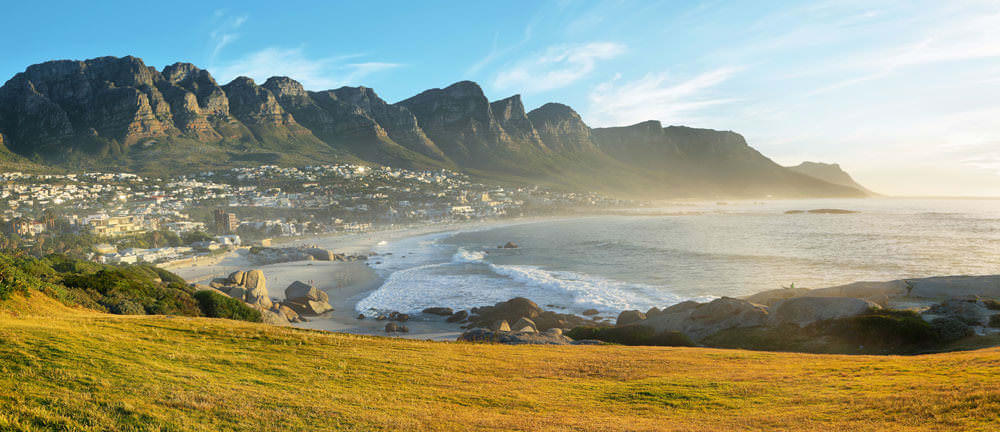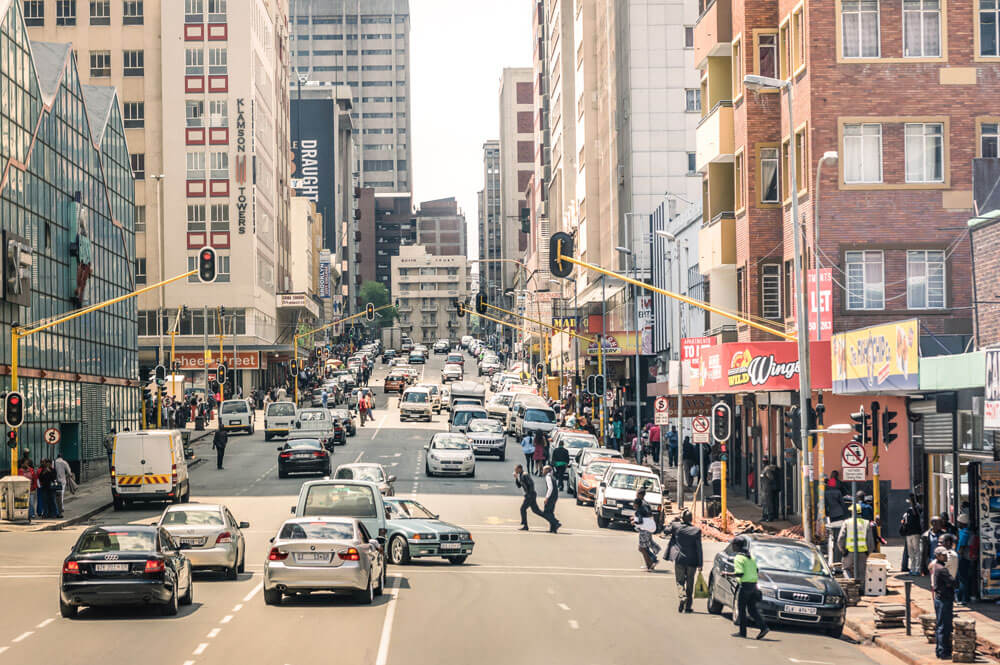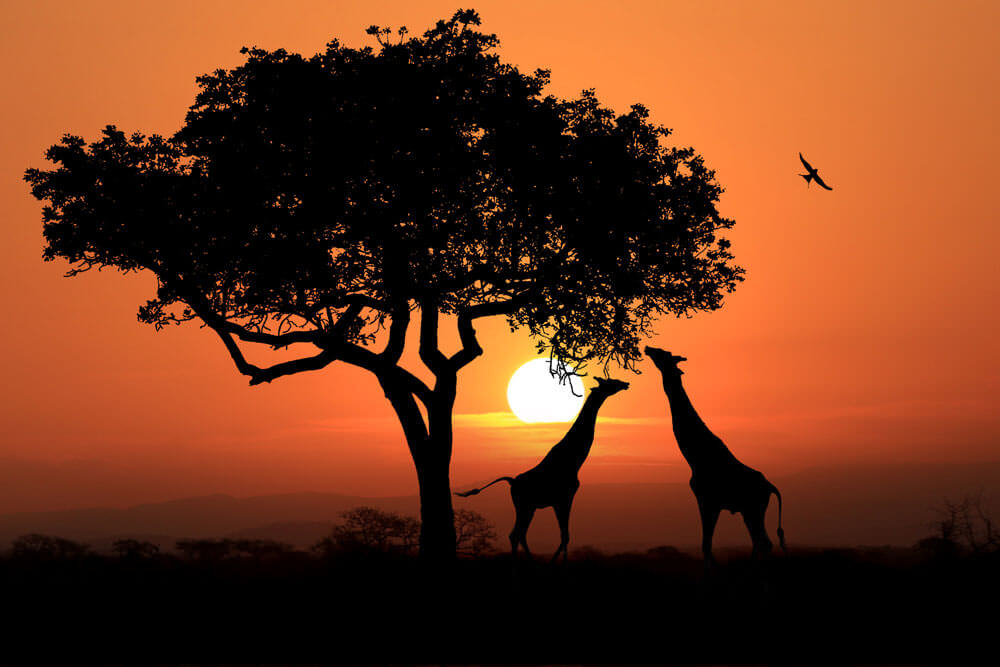South Africa

Capital city: Pretoria (executive), Cape Town (legislative), Bloemfontein (judicial)
Population: 59,980,142 (2021)
Land area: 1,221,037 km²
Official languages: English, Afrikaans, Ndebele, Sepedi, Xhosa, Venda, Tswana, Southern Sotho, Zulu, Swazi/ SiSwati, Tsonga
Legal system: A mixed legal system of Roman Dutch civilian law, English common law, customary law and religious personal law
Time zone: GMT+2
Currency: Rand (ZAR)
GDP: 329.53 USD Billion (2021 est.)
Main industries: Mining, automobile manufacturing, metalworking, technology, machinery, textiles, iron and steel, IT, chemicals, fertiliser, foodstuffs, manufacturing, commercial ship repair
Principal exports: Platinum, gold, iron, cars and coal
Located at the southernmost tip of the African continent with the Atlantic Ocean to the southwest of its coastline and the Indian Ocean towards the southeast, the Republic of South Africa is bordered by four fellow Commonwealth countries- Eswatini, Mozambique, Namibia and Botswana- to the northeast and northwest and non-Commonwealth Zimbabwe to the north. Lesotho, another Commonwealth member state, is an enclave in the eastern part of South Africa. The country is unique in the fact that it has three capitals; Pretoria in the northeastern province of Gauteng is the administrative council, Bloemfontein in the east-central Free State province is the national judicial capital, and the city of Cape Town of the Western Cape Province is the legislative capital.
South Africa is a beautiful and vibrant country that is home to 290 conservation parks and eight World Heritage sites and is considered to be the “Cradle of Humankind” due to the belief that human life originated in these lands. The country’s land area is divided into two different physiographic classifications; the interior plateau, a direct continuation of the African plateau that stretches to the Sahara Desert, and the exterior coastal strip is divided into three subcategories: the Cape folded belt, the eastern plateau slopes and the western plateau slopes. The boundary between the interior and exterior topographies is called the uKhahlambathe, the Natal Drakensberg or the “Great Escarpment” and is considered one of the most defining features of South Africa due to its steep slopes and beautiful scenery of the plateaus and lower plains. Aside from the country’s mainland, South Africa also administers two subantarctic islands, Prince Edward and Marion, located approximately 2000 km southeast of Cape Town.

Demographics
According to the World Bank, the population of South Africa was recorded at 59.31 million at the end of 2021. The Black African population constitute 80.9% of the total population, the rest of the population consists of the white population and mixed ethnicities. South Africa’s multicultural society lends to its linguistic diversity due to which the state has 11 official languages; isiZulu which is the lingua franca spoken by 25.3% of the population, isiXhosa, Afrikaans, Sepedi, Setswana, English, Sesotho, Xitsonga, siSwati, Tshivenda, and isiNdebele. Other languages including the Khoi, Nama, and San languages are also spoken by 2% of the population.
The South African population is predominantly Christian (86%), 5% practice traditional African religions, 2% practice Islam and the remaining population practice other religions including Hinduism, Buddhism and Judaism. South Africa has a youthful population with 45% being under the age of 25. Almost 70% of South African citizens residing in urban areas.
History
As the “Cradle of Humanity” title suggests, the ancestors of modern humans, known as hominins, are said to have originated and settled in the territory that is now South Africa, 3 million years prior to the arrival of modern humans who have since dwelled in the lands for over 100,000 years through the Stone-Bronze-Iron Ages. The San and Khoi, two indigenous groups that lived in the area, were known for their hunter-gatherer and pastoralist lifestyles. The San were skilled at rock art and lived in small groups, while the Khoi were known for their herding of cattle and sheep.
In the 1480s, the Portuguese became the first Europeans to explore the region, followed by the Dutch in the 17th century. In 1652, the Dutch East India Company established a way station at Cape Town, which would become the first permanent European settlement in South Africa. The Dutch settlers, known as Boers, were primarily farmers who traded with passing ships. By the late 18th century, Britain had established colonies in many parts of the world, and South Africa was no exception. In 1795, the British seized control of Cape Town during the Napoleonic Wars, and in 1814, Britain officially gained control of the Cape Colony. The British settlers who arrived in South Africa were largely English-speaking and Protestant, in contrast to the Dutch-speaking Boers who had settled there earlier. As the British continued to expand their control over South Africa, tensions grew between the Boers and the British. In 1835, many Boers left the Cape Colony in a movement known as the Great Trek, in which they migrated northwards in search of land and freedom from British rule. This migration led to the establishment of the Boer republics of Transvaal and the Orange Free State.
The 19th century saw the rise of various African kingdoms and the arrival of missionaries, who established schools and introduced Christianity. Simultaneously, gold and diamonds were discovered in the Boer republics, leading to an influx of British immigrants and tension between the Boers and the British. However, the period was also marked by wars between the British and the Boers, culminating in the two Anglo-Boer Wars of 1880-81 and 1899-1902. The war ended in 1902 with the Treaty of Vereeniging, which brought the Boer republics under British contro and in 1910, the Union of South Africa was formed, bringing together four British colonies and two Boer republics into a single country.
In 1948, the National Party government instituted apartheid, a system of racial segregation and discrimination that would last for nearly five decades. The apartheid regime enforced strict racial classifications, with black South Africans subjected to forced removals, limited job opportunities, and restricted access to education and healthcare. The African National Congress (ANC), a political party formed in 1912, became a key player in the struggle against apartheid. In the 1960s and 1970s, the ANC and other anti-apartheid groups were banned and many of their leaders were imprisoned or forced into exile.
In the 1980s, the international community began to increase pressure on South Africa to end apartheid, with economic sanctions and other measures. In 1990, President F.W. de Klerk lifted the ban on the ANC and released Nelson Mandela from prison after 27 years, signaling the beginning of the end of apartheid. Negotiations between the government and the ANC led to the adoption of a new constitution in 1994 and the first democratic elections in South Africa, in which Mandela was elected as the first black President of the country. Since then, South Africa has made significant progress in establishing a multi-racial, multi-cultural democracy
Key Dates
300-400 Migrants from the north arrive to the territory, joining the indigenous San and Khoikhoi people
1497 Portuguese explorer Vasco da Gama makes landfall on Natal coast.
1652 Jan van Riebeeck, representing the Dutch East India Company, founds the Cape Colony at Table Bay.
1795 Cape Colony taken from the Netherlands by the British. The territory is returned to the Dutch in 1803 before control is ceded to British in 1806.
1816 Shaka Zulu founds the Zulu empire
1835-1840 Boers leave Cape Colony during the ‘Great Trek’; the Orange Free State and the Transvaal founded
1852 Limited self-government granted by the British to the Transvaal
1856 Natal separates from the Cape Colony to become separate territory and Transvaal declared a republic by the Boers
1880-81 The first Anglo-Boer War begins. Conflict ends with a negotiated peace and Transvaal is restored as a republic
1899 British troops gather on the Transvaal border and ignore an ultimatum to disperse leading to the start of the second Anglo-Boer War
1902 Treaty of Vereeniging ends the second Anglo-Boer War. The Transvaal and Orange Free State are made self-governing colonies of the British Empire
1910 The Union of South Africa comprising former British colonies of the Cape and Natal, and the Boer republics of Transvaal, and Orange Free State, is formed
1912 The Native National Congress is founded; later renamed as the African National Congress (ANC)
1919 South West Africa (Namibia) put under South African administration
1934 The Union of South Africa parliament enacts the Status of the Union Act, declaring the country to be “a sovereign independent state”.
Legal System and Government
South Africa is a parliamentary representative democratic republic with a three-tier system of government: national, provincial, and local. The national government is headed by the President of South Africa, who is elected by the National Assembly. The National Assembly is the lower house of the Parliament of South Africa, which is responsible for passing legislation and overseeing the work of the government. The executive branch is headed by the President, who appoints a cabinet of ministers to assist in the administration of government. The legislature is responsible for making laws and overseeing the work of the government, and is made up of the National Assembly and the National Council of Provinces. The judiciary is responsible for interpreting the laws and ensuring that they are applied fairly.
The provincial governments are headed by Premiers and are responsible for implementing national policies and legislation within their provinces. Each province has its own legislature and executive, and is divided into municipalities. The local government is responsible for providing basic services such as water, electricity, and sanitation to communities. It is made up of municipalities, which are divided into wards and are governed by elected councils.
The legal system of South Africa is a hybrid legal system that combines elements of both the civil law system and the common law system; customary law is recognised and applied by the courts in matters involving traditional communities and their practices. It is based on the Constitution of South Africa, which was adopted in 1996 and is considered the supreme law of the country, setting out the law of the land and outlining the basic principles of government and human rights. The South African legal system is overseen by the judiciary, which is independent and impartial. The judiciary is made up of various courts, including the Constitutional Court, the Supreme Court of Appeal, and the High Court.
Economy
South Africa is the third largest economy of Africa and is one of the eight upper-middle- income countries on the continent. The nation’s economic foundation is built upon private enterprise and is known for its thriving tech startup ecosystem, state-of-the-art infrastructure and abundance of natural resources. South Africa is a leading financial hub on the continent as well, with the South African stock exchange ranking among the world’s top 20 in terms of market capitalisation.
The industry sector comes second, contributing 24.5% of GDP in 2021 and employing 22.7% of all workers. Manufacturing is a key element of the country’s industrial sector, contributing 12% of GDP; agro-processing and the manufacturing of automobiles, chemicals, metal products, textile and electronics are amongst the main manufacturing products South Africa is known for.
The mining industry also plays a pivotal role in South Africa’s economy, contributing 8.6% of GDP and employing roughly half a million people. It is the world’s largest producer of numerous raw materials, including chrome, manganese, platinum, vanadium and vermiculite. Particularly, the nation is the producer of 80% of the world’s platinum. South Africa is also the second-largest producer of ilmenite, palladium, rutile and zirconium, and the third-largest coal exporter in the world. Additionally, the country is famous for being a huge exporter of diamonds and iron ore.
That said, the most important sector remains to be the services industry, representing 61.2% of the country’s GDP and employs approximately 72.3% of the nation’s workforce. Finance, real estate, business and general government services are the key contributors to the local economy as they alone contribute 20% of GDP.
10% of South Africa’s land area is arable and 14% of the expanse is forested. Agriculture, forestry and fishing combined contribute 2.5% of GDP, making it the smallest sector in terms of GDP contribution. Be that as it may, South Africa still has an impressive agricultural industry; it has a robust grain industry producing barley, maize, oats, sorghum and wheat and is amongst the ten leading nations globally in terms of corn production. The sector is seeing an impressive growth rate, expanding by 8.3% in 2021 second to the mining industry that expanded by 11.8%. The sector contributes just under 10% of total product exports.

Trade
South Africa’s 2021 GDP was recorded to be US$419 billion and is expected to reach US$420 billion by the end of 2021. For the year 2021, South Africa’s top product exports were pearls, precious stones, metals, coins (28.2%), ores, slag and ash (14.9%), vehicles other than railways, tramways (8.6%), and mineral fuels, oils, distillation products (8.3%). The top destinations for South African exports in 2021 were China (11.2%), the United States (10.6%), Germany (8.5%), and the United Kingdom (6.7%). As for imports in the same year, South Africa mainly imported mineral fuels, oils, distillation products (16.5%), machinery, nuclear reactors, boilers (12.1%), and electronic equipment (9.2%). These imports were mainly sourced from China (20.6%), Germany (8.2%) and the United States (7.0%).
As a member of the Southern Africa Customs Union (SACU), South Africa has tariff-free trade agreements with four other African commonwealth countries, namely Botswana, Lesotho, Namibia, and Eswatini. Additionally, as part of the SACU, South Africa signed an Economic Partnership Agreement with the EU, providing preferential market access, investment protection and promotion bilaterally. The country also has bilateral agreements with Russia, China, Cuba, and Iran.

Investment Opportunities
South Africa has the largest presence of MNCs on the African continent and is celebrated as the most diversified economy in Africa. South Africa also enjoys a strategic geographical location, rendering it an ideal hub to access the sub-Saharan markets. Coupled with a large pool of skilled labour, abundant natural resources, secure working conditions, several trade agreements, and a strong academic and research foundation South Africa is an ideal economy for foreign investors to look into.
Emerging from the devastating impact of COVID-19 across the globe, the government of South Africa has identified several sectors to prioritise based on their growth potential and marketability which include agro-processing, chemical industries, clothing and textiles, electronics, metals and minerals industries, sustainable tourism, transport and ICT and outsourcing services.
Many incentives and tax rebate schemes have been made available by the South African government to encourage foreign investment, especially in the country’s nascent sectors and industries. These incentives include, but are not limited to, the Foreign Investment Grant providing 15% reimbursement on machinery bought by industries relocating to South Africa, duty-free imports on import of products related to the industry as well as zero value-added tax (VAT) for materials sourced within South Africa by foreign companies working in Industrial Development Zones, a Skills Support Programme offering reimbursement on 50% of training costs and 30% of worker salaries for a maximum of three years, 12% tax incentive on greenfield investments, and many more such incentives. South African Special Economic Zones (SEZs) also provides separate perks such as preferential 15% corporate tax and tax relief, building allowance and employment tax Incentives.
Sources
https://www.britannica.com/place/South-Africa
https://www.history.com/topics/africa/south-africa-history
https://www.gov.za/about-sa/south-africas-people#beliefs
https://www.cia.gov/the-world-factbook/countries/south-africa/#people-and-society
https://www.bbc.com/news/world-africa-14094918
https://zuidafrika.nl/trade-investment/investment-in-south-africa/
https://www.investcapetown.com/how-can-we-help/incentives/
http://www.justice.gov.za/legislation/constitution/SAConstitution-web-eng.pdf
https://tradingeconomics.com/south-africa/gdp
https://data.worldbank.org/indicator/NV.IND.MANF.ZS?locations=ZA
https://www.southafrica.net/gl/en/business/page/manufacturing
https://www.trade.gov/country-commercial-guides/south-africa-agricultural-sector